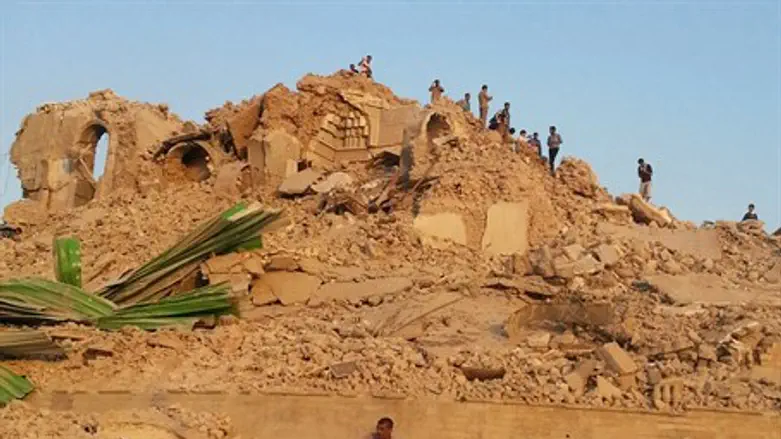
After destroying the Tomb of Jonah (Yonah), one of the Jewish prophets from Biblical times, shortly after conquering Mosul in Iraq where the tomb is located last July, the brutal Islamic State (ISIS) terrorist organization is now planning to construct a park over the important site.
Al Arabiya reported on Saturday that local sources in Mosul had revealed the day before that ISIS is beginning to level the area of the tomb and transform it, noting a budget has been allocated for the project and "specialized companies" have been tapped to commence building.
Responding to the reports, Iraqi Deputy Minister of Antiquities and Tourism Qais Hussain told the local Al-Sumaria News that ISIS apparently intends to transform "the tomb into a park and fun city which is another crime against Iraqi heritage."
The ministry has "a plan after liberating conquered cities from ISIS," he said, adding that there is "a committee that is currently working to minimize damages being done to heritage sites."
So far Iraqi forces aided by US airstrikes and Iran-backed militias have been unable to recapture Mosul, although renewed attempts appear to be imminent.
Mosul in northern Iraq was a key initial victory for ISIS last June, as it gained a foothold in northern Iraq and began its massive offensive that saw it capture larges swathes of the country as well as expansive regions in Syria.
The jihadist group has been destroying non-Muslim or Shi'ite Muslim sites, in an attempt to rewrite history and wipe out other cultures and religions.
Back in July when Jonah's Tomb was destroyed the tomb of another ancient Jewish prophet, Daniel, was also destroyed in the Mosul area.
Jonah's Tomb is said to have dated from the 8th century BCE.
After the tomb was destroyed, thieves reportedly dug into an unexcavated palace in Nineveh that was located underneath the tomb.
